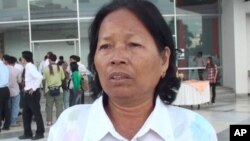WASHINGTON - “Red Wedding,” a documentary that explores forced marriage under the Khmer Rouge, has won an award from the International Documentary Film Festival of Amsterdam.
The film explains what it was like for some 250,000 women who were forced into marriage in the 1970s, through the eyes of a woman named Pen Sochan, who was forced into marriage and raped by her husband.
The film’s producer, Lida Chan, told VOA Khmer this week that Pen Sochan was stigmatized, traumatized and forced to live in shame since she was 16 years old.
Now 48, Pen Sochan has filed suit with the UN-backed Khmer Rouge tribunal, blaming the regime’s top leadership for the systemic crime.
“Other victims are happy, because Mrs. Pen Sochan is the first person to reveal the truth and clarify the issue, which people rarely speak about,” Lida Chan said. “Mrs. Pen Sochan is happy, and she feels relief because others understand her feelings.”
Women forced into marriage under the regime’s policies had little choice in the matter. If they refused, they would be sent to camps, or executed,” Lida Chan said. So telling the story was important, she said, and she wanted to do it through a main character. She chose Pen Sochan because of her participation in the tribunal, which provided a new development in the lives of survivors of the regime and those who endured forced marriages.
She said being awarded by the Amsterdam film festival in November was an honor for her and her team, which spent a year working on the film. Much of the film is shot in Pursat province, during seasons of farming, including planting and cultivation. At the heart of the story is Pen Sochan, who still suffers from the effects of her forced marriage.
“I did not expect she would suffer for 30 years,” Lida Chan said. “Her ordeal, the trauma, fear, and hiding her face, caused her to keep silent in a small village without speaking out about the truth. It was a point that made me want to know more about these red weddings and what they meant for the Khmer Rouge regime. It was the first time in my life that I learned what happened in that regime.”
Researching the film taught her that it just wasn’t torture, killing and starvation that people suffered, but other abuses as well, she said.
Today, Pen Sochan is a widow, with six children she had with her second husband, whom she married after the fall of the regime. When the Khmer Rouge lost power, the man she had been forced to marry stayed with her for only three days.
Lida Chan said she produced the film in the hopes that other victims would speak out about their lives, or see the film and take steps toward healing and reconciliation. But she also said she would provide the film to the Khmer Rouge tribunal as evidence if asked.
And she said she would like to ensure that the red weddings never happen again. Despite that, she said, forced marriages do take place in families, with parents forcing their sons and daughters into arranged marriages.
“Forced marriage is a situation that should not happen, neither during the Khmer Rouge nor in the present,” she said. “It is a marriage that takes place without the approval of either side. I would like to urge that marriages be agreed on by both sides.”
Filmmaker Says Stigma from Khmer Rouge Forced Marriages Endures

“Red Wedding,” a documentary that explores forced marriage under the Khmer Rouge, has won an award from the International Documentary Film Festival of Amsterdam.



